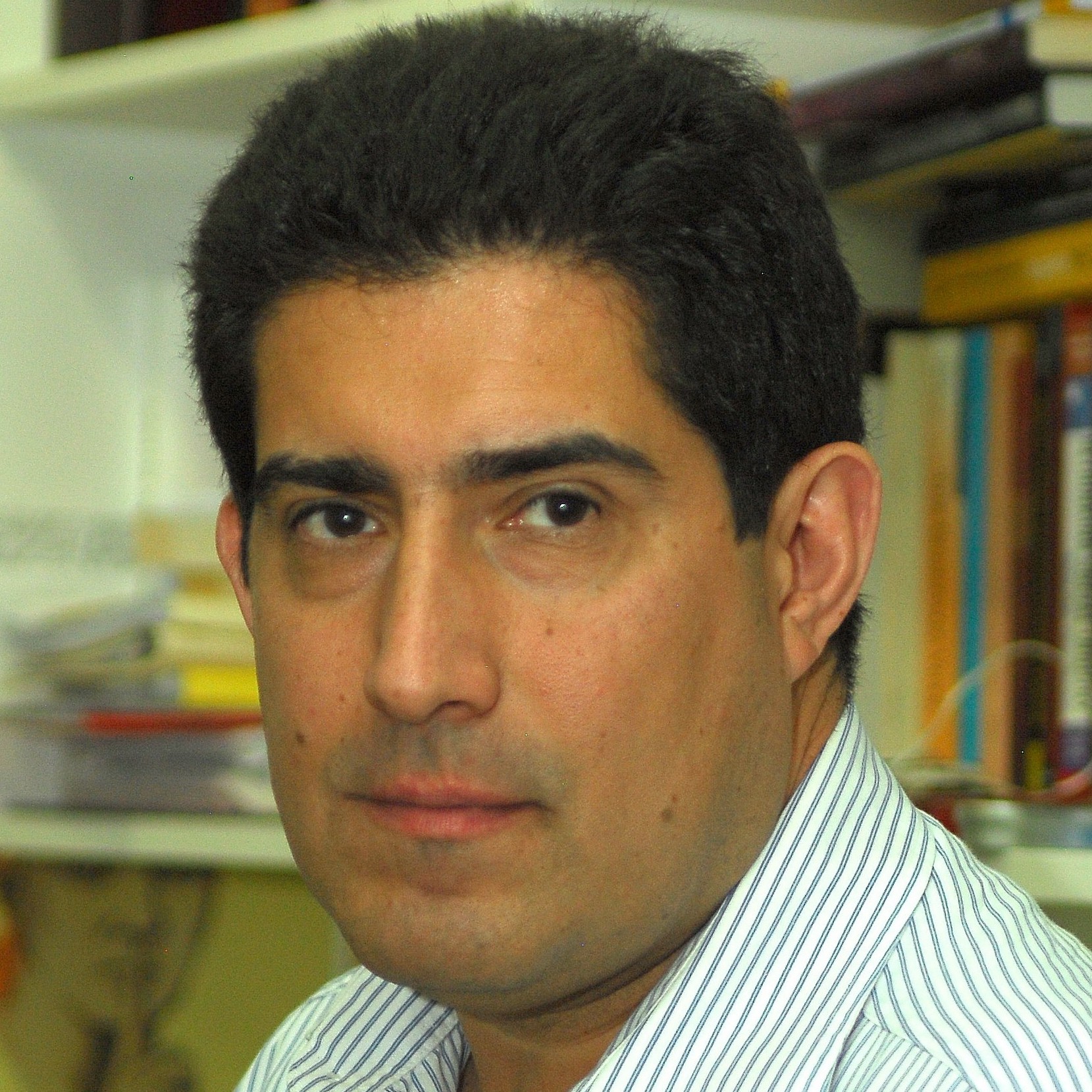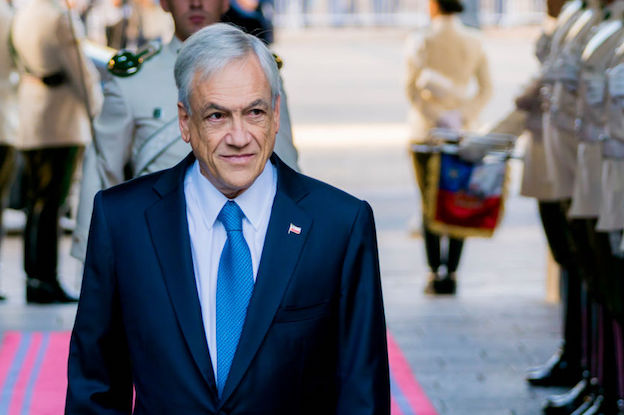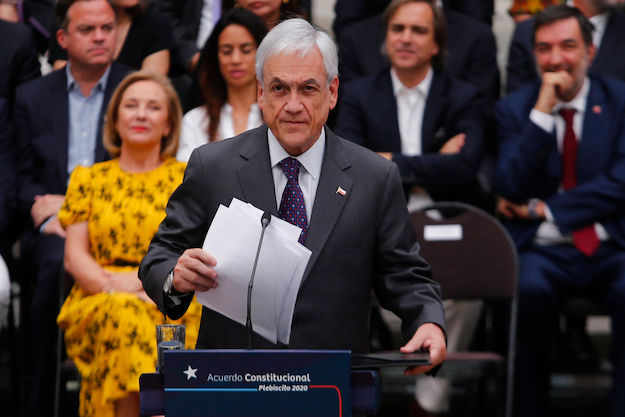In well-functioning democracies, alternation in power should be a momentous event, but not necessarily a traumatic occasion. As former president (2010-2014) Sebastián Piñera takes office for the second time in Chile, the South American country should take pride in having a well-functioning democracy. Chileans are eager to see how the new center-right administration will implement its own priorities and fulfill its campaign promises. Fortunately, though there are reasonable levels of anxiety and fear, few in Chile feel the country will experience a radical shift in any direction in the coming months.
Transitions haven’t always been so smooth. Since the restoration of democracy in 1990, Chile has undergone three alternations in power. After four consecutive center-left Concertación governments (1990-2010), Sebastián Piñera became the first right-wing president since the end of the Pinochet dictatorship (1973-1990). It was understandable that his inauguration on March 11, 2010 would be characterized by high levels of uncertainty. After all, many of the members of the Alianza right-wing coalition had been active supporters of the military dictatorship. Piñera would need to prove that democratic values would prevail in his government.
Because Chile had been successfully governed by four consecutive center-left and market-friendly governments, the arrival of a new right-wing government generated concern among a majority of Chileans who valued the stability and widespread growth that characterized the Concertación governments. Outgoing Concertación President Michelle Bachelet (2006-2010), the first woman president of Chile, was highly popular, but had been unable to transfer that popularity to the Concertación candidate in 2010. After two decades of center-left governments, the promise of change that Piñera ran on resonated well with Chileans and helped him narrowly win the election runoff.
To add to the uncertainty, a devasting earthquake hit Chile two weeks before Piñera’s inauguration in 2010. The slow response to the tragedy by the outgoing Bachelet government made Piñera’s inauguration an even more significant event. The day Piñera was inaugurated, a new earthquake hit the country just minutes before the swearing-in ceremony. Nature had made it impossible for the transfer of power to go down smoothly.
In 2014, the center-left coalition – renamed Nueva Mayoría – came back to power led by Bachelet, who remained very popular. The difficulties faced by the Piñera administration diminished the electoral chances of his right-wing coalition. Bachelet easily won the runoff with 62.2 percent of the vote. Because she had campaigned on radical transformations that would strengthen the role of the state in Chile’s market-friendly economy, that alternation in power was surrounded by high expectations and concerns about the consequences of a radical shift to the left that Bachelet promised to deliver. The inclusion of the Communist Party in the center-left coalition, and Bachelet’s promise that she would push for a new constitution to replace the 1980 constitution imposed by Pinochet (but heavily amended since the restoration of democracy) confirmed the expectations that she would make a radical leftwing shift. Thus, rather than reassuring voters with a discourse that would emphasize the fact that Bachelet was returning to power, the new center-left administration sent the message that it would be radically different from the type of governments that Chileans had experienced up to that point.
On March 11, 2018, Chile underwent its third alternation in power since the restoration of democracy. Pinochet died 12 years ago, and the right-wing coalition put to rest all concerns about its democratic values under the first Piñera government. To make things easier for Piñera, Bachelet was struggling with her approval as most Chileans rejected the way in which she sought to implement the radical transformations she campaigned on. The Chilean economy showed modest growth under Bachelet and unemployment rose. This time around, there was no earthquake. The conditions under which Piñera returns to power are much more favorable to him than in 2010.
Besides, this is the second time around that Bachelet ceded power to Piñera. As in 2010, the outgoing left-wing president turned power over to a democratically elected right-wing leader. Chileans feel this is a transition that they already experienced.
So, not surprisingly, the alternation in power that took place in Chile on March 11 was a newsworthy event, but not a traumatic occasion. The Piñera administration has promised to restore the gradual and pragmatic approach that characterized all governments since the restoration of democracy in 1990. People no longer fear that a right-wing government will bring the country back to the years of authoritarianism. The center-left opposition is divided and fragmented – thus, Piñera will not need to compete with a popular opposition leader as he did his first time.
For all these reasons, the mood of Piñera’s inauguration on March 11 was festive but not dramatic. As president, Piñera will have hits and misses. His focus on economic growth will likely produce faster results than those achieved under Bachelet. If he fails to meet the expectations of increased social spending or if his government makes unexpected errors, social movements will probably seize the moment and put his administration on the defensive (as happened in 2011 with the student protests). Yet, Piñera is now more experienced as a president. His coalition already benefitted from a learning curve after the first right-wing administration.
Yet, after day one of the new Piñera government, there is one lesson to be learned. When democracy works well, alternations in power are meaningful events, but they are not distressing moments. People might be hopeful or sad to see an ideological change in government, but nobody is excessively anxious or fearful. Compared to previous alternations in power in Chile, March 11, 2018 will go down in history as somewhat of an uneventful moment, perhaps even a boring one. But when it comes to democracy, boring alternations might also be a sign of good health.
—
Navia is a contributing columnist for Americas Quarterly, professor of liberal studies at NYU and professor of political science at Diego Portales University in Chile.








